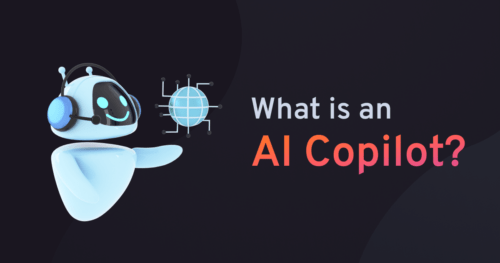What is an AI Copilot?
AI Copilots also known as Copilot AI are virtual assistants powered by Artificial Intelligence (AI) to increase productivity and efficiency in any workplace and settings. Using large language models (LLMs) enables natural, human-like conversations to help users with many tasks. AI copilot can assist users without being human, highlighting the evolution from basic chatbots to more advanced AI assistants.
AI copilot means different things in different domains and industries. For example, an IT copilot might automate service management by resolving tickets, diagnosing systems, and providing real-time support, while an HR copilot might streamline onboarding, answer policy questions, and help managers track performance.
A great example of a copilot is Aisera’s Enterprise AI Copilot, an AI companion that shows what AI can do in the enterprise across different domains and industries. Another example is Microsoft 365 Copilot which is a personal assistant in the MS Windows environment.
A copilot AI is designed to integrate with existing tools and workflows, providing real-time support without disrupting the user’s workflow. By being compatible with productivity software, code editors, and collaboration platforms AI copilots are available to everyone, across all professional environments and use cases.
How Does AI Copilot Work?
An AI copilot is meticulously designed to boost productivity and smoothen operational processes with a high level of accuracy. They can predict user needs with precision and offer custom solutions. Let’s take a look at the AI Copilot mechanism to see how it works.
Initially, copilots utilize basic API calls to Large Language Models, offering general assistance but may lack specialized knowledge. Advancements include Domain-specific LLM implementations enhancing security, privacy, and relevance, though typically focused on straightforward tasks.
More complex configurations have multiple LLMs working together to tackle a broader range of challenges by leveraging their combined capabilities and resulting in systems designed for complete organizational support, decision making, and for large enterprise needs. However, advanced integration requires a substantial investment in infrastructure and careful attention to integration patterns.

Benefits of AI Copilot for Businesses
AI copilots harness the power of artificial intelligence and seamless integrations to anticipate user needs and deliver timely, relevant, and proactive suggestions, including support in customer service, e-commerce, and lead generation. It’s a small wonder that companies are eager to adopt AI Copilot for its ability to facilitate interactions, answer FAQs, and enhance lead generation efforts. Here are just a few samples of the value of AI-powered copilots.
1- Increase Productivity
Copilots anticipate and suggest to help users get work done faster and with enterprise-specific insights. User productivity is boosted when suggestions can be acted upon through 3rd party integrations and AI workflows for popular back-end systems including IT, HR, finance, legal, and facilities. Enterprise Copilot is integrated into the most popular enterprise apps and reduces the time spent on time-intensive tasks. It can write, edit, summarize, and generate content at the touch of a prompt, pulling in relevant information from across the organization. AI copilots can also generate images from textual prompts to enhance productivity.
Leveraging AI copilot to boost productivity is not limited to the USA. Large Indian companies like Axis Bank, Infosys, HCL Tech, and LTIMindtree invest in copilot AI according to Indiatimes. They see an average of US$3.86 return for every US dollar they spend on AI projects.
2- Cost Savings
Operational expenses decline when Copilots free up human resources by anticipating and automating mundane tasks that are highly repetitive. By unlocking the cost-saving potential in IT, HR, Customer Support, and other departments, businesses can free up funds to invest in progressive new solutions with innovation that boost overall efficiency.
3- Contextual Information Dissemination
An Enterprise AI Copilot leverages AI infrastructure models and machine learning to understand and create context-aware dialogues from in-house knowledge repositories and trusted 3rd party websites. It provides relevant suggestions and solutions, specific to the enterprise, reducing time spent on tedious research and ensuring accurate answers.
4- Continuous Learning
An AI Copilot has the capability of continuously learning to fit specific changing enterprise needs, as well as adhere to the standards of your industry. Continuous learning is a method whereby a machine-learning model keeps developing and improving over time as it is exposed to new data. This resembles how humans have learned skills and attained or discarded knowledge.
Continuous learning allows Copilot to adapt and improve over time, making it a powerful tool for various tasks and decision-making processes for businesses.
5- Real-Time Assistance
An artificial intelligence-powered Copilot provides real-time assistance to provide immediate help to enterprise customers and employees in various tasks offering immediate, context-aware support, enhancing employee productivity, and optimizing business operations as an outcome.
Customers and employees can get the information they need, on-the-go from the appropriate source, and exactly when needed. AI copilots can predict and improve ‘reply’ rates in communication strategies, enhancing engagement and interaction quality.
For example, AI assistants can auto-resolve issues, saving support costs and improving the customer experience. Easy access to knowledge, automated summaries, and optimized responses are all generated in one click.
6- Omnichannel Support
AI Copilots can serve as the foundation for omnichannel customer support, facilitating smooth conversational interfaces across a user’s preferred channels—whether on collaboration platforms like Slack or Microsoft Teams, email, mobile applications, or web portals.
Employees or customers can enjoy convenient, uninterrupted interaction, whatever their preferred channel of communication. The importance of a chat interface, especially in platforms like Microsoft Teams and Slack, cannot be overstated, as it enhances the conversational experience by allowing access to data across various work applications, assisting with tasks, and providing answers based on content in documents, meetings, and chats.
7- Seamless Multilingual Communication
The ability to communicate in a user’s native language is built into enterprise Copilots. Enterprises can service diverse copilot users and deliver a superior experience for customers and employees regardless of location across the globe.
8- Enhanced User Creativity
AI Copilots empower each contributor to resolve tasks, add details, troubleshoot, and communicate in human-like conversations. Creative dry spells are a thing of the past. Teams can enrich their work product with colorful presentations, compose engaging emails, and zero in on action items.
9- Elevated Information Quality
Outdated, irrelevant information can create controversy, damage credibility, and affect the bottom line. AI Copilots enhance response accuracy, relevance, and quality of results through contextual relevance and access to enterprise-specific data sets.
10- Acquire and Up-Level Skills
Copilots move a user to the forefront of progress in their particular skill set through AI Agent assist. That makes people better at what they’re already good at while enabling users to reach out to diverse areas of learning to acquire new skills.

AI Copilot Applications
AI Copilots are transformative for enhancing productivity and solving problems. They provide instant guidance for tasks that would otherwise absorb vast amounts of time and resources. These AI copilot use cases include automating instant responses to frequently asked questions like in Bing, assisting account reps in addressing mundane queries in real-time, and even solving complex issues based on historical data. Companies are announcing new features and experiences within AI copilots to enhance productivity.
Spanning retail and e-commerce, insurance, healthcare, telecom & utilities, hospitality & travel, banking & finance, there is virtually no limit to the efficiency and cost savings.
HR Copilots: Enhancing Human Resources Efficiency. HR copilots are transforming the landscape of human resource management by autonomously handling employee queries and supporting decision-making processes. By streamlining operations and reducing administrative burdens, these AI-driven assistants increase efficiency and employee satisfaction across organizations. This allows HR teams to concentrate more on strategic initiatives, significantly elevating their role and impact.
Code Completion: AI-powered algorithms help software developers and programmers code more quickly and accurately. Platforms like GitHub Copilot rely on AI to comprehend context and predict code snippets, lowering error rates and improving performance.
AI Writing Assistants: Writing tools are making headlines with their ability to offer real-time support and suggestions for perfecting grammar, punctuation, style, and clarity. Jasper, Writer, and OpenAI’s ChatGPT are some popular AI tools that reduce frustration while elevating writing quality.
Personal Financial Assistants: AI Copilots for personal finance assist people in managing their finances by offering budgeting insights, expense tracking, investment recommendations, and customized financial advice. For example, the ability of a copilot for finance to objectively analyze financial data helps users handle money intelligently and achieve their financial goals.
AI Health Coaches: A health coach copilot assists people in optimizing their fitness, training, and healthy eating. These copilots work with clients to achieve the specific plans and results they choose.
Enterprise AI Copilots: Enterprise-grade copilots like Agent Copilots are proliferating as major global companies, including Salesforce, Microsoft 365, and ServiceNow, unite their operations across diverse systems and become part of their offerings. These copilots facilitate collaboration, manage and perform tasks, and boost productivity for employees and customers, enhancing morale and satisfaction.
Ethics, Governance, and Reliability of AI Copilots
The scope of AI ethics spans immediate concerns such as bias, data privacy and transparency in AI systems. Those deploying AI should be accountable for their actions. To mitigate and prevent risks, governments and AI industry leaders are rolling out AI governance initiatives and policies.
Guiding principles include justice, fairness, reliability, privacy and security, inclusivity, transparency, and accountability, all of which should govern AI development and use.
AI has brought ethics to the foreground, along with security and privacy. Phenomena like deepfakes and misinformation can be perpetuated by AI-generated texts or media and threatens objectivity, with the risk of polarizing societies. If training data harbors biases, outputs may reinforce stereotypes, leading to skewed and unfair results.
Dealing with bias is an ethical consideration with traditional machine learning systems and a clearly defined data set. When scaling large foundational models like those used for code, text, or image generation, you need policies or controls in place to detect biased outputs and deal with them consistent with company policy and relevant legal requirements.
Inclusiveness: AI systems should empower and engage people, This principle seeks to include all human races’ experiences. Where possible, speech-to-text, text-to-speech, and visual recognition should be used to empower those with hearing, visual, and other challenges.
Reliability and Safety: For AI systems to be trusted, they must be reliable and secure. Rigorous testing and validation must be deployed, and a robust monitoring and model tracking process needs to reactively and proactively measure performance and retrain as necessary.
When it comes to cybersecurity, companies need to prepare for the potential of malicious actors using AI systems for cyber and fraud attacks. Companies should confer with their cyber-insurance provider to verify that existing policy covers AI-related breaches.
Other Challenges with Leveraging AI Copilots
While AI Copilots offer numerous benefits, there are also challenges and considerations to be addressed. It’s important to view AI Copilots as tools that augment human capabilities rather than replace them. Ongoing training and development are crucial to ensure that employees can work effectively with AI Copilots and leverage their full potential.
Businesses must also align their processes with AI capabilities to maximize the benefits of AI Copilots. This involves integrating AI Copilots into existing workflows and ensuring seamless collaboration between humans and AI. By addressing these challenges and considerations, businesses can harness the power of AI Copilots to drive efficiency, innovation, and growth.
Future Trends and Directions for AI Copilots
It’s a safe bet that AI Copilot features and capabilities will continue expanding. “Expect people to continue feeling more digitally understood and relevant than ever,” predicts Accenture. People used to manually enter data into a screen, and then click to access other areas. Now, users can increasingly rely on natural language to simply query or make a request and the copilot will promptly retrieve the relevant information.
Microsoft has received a swift and unequivocally positive response from enterprise customers using their Copilot. Seventy percent of early users felt they were more productive, while 68% believed it improved the quality of their work.
Not surprisingly, over 60% of Fortune 500 companies are adopting Copilot, while 77% of employees don’t want to go back to work without it, according to Jared Spataro, CVP Modern Work and Business Applications, who shared this intelligence at the 2023 Microsoft Ignite event.
Adding to this surfeit of success, 85% of users felt it helped them get to a first draft faster, while 71% felt rescued from mundane tasks. Sixty-four percent acknowledged their relief from the burden of email.
Though these statistics speak for themselves, it’s vital to understand the capabilities of the particular AI Copilot you are considering vis a vis your company’s unique needs. Copilots will quickly become integral to your organization—a close ally that reaches across your systems to increase productivity, improve performance, and drive ROI.
So choose the platform that best aligns with your industry, domain, and technology environment in order to optimize its value.

Evaluating Key Considerations to Choose AI Copilots
When choosing an AI Copilot (Copilot AI), it’s smart to work on galvanizing excitement and educating users. Focus on the features and capabilities that an AI Copilot brings in terms of productivity, performance, and user satisfaction. The following considerations help you realize optimal results.
Data security and compliance: Evaluate your choice of AI Copilot in terms of solid security, regulatory compliance, and confidentiality/privacy across personal, group, and users.
Enterprise fit and context: Ensure that the AI Copilot you consider comprehends your context and can leverage your business-specific data accurately and securely.
Integration and Scalability: Be sure that your AI Copilot is robust enough to scale as you grow and that it is capable of integrating smoothly with your enterprise-wide applications.
Engage people during implementation and address issues promptly to maintain the process a positive one. Finally, work on your roadmap to stay in control of business impact when you adopt AI Copilots. The journey is exciting, unique, and historical, and you are all an integral part of it.
Getting Started with AI Copilot
Before delving into the innovative world of Generative AI with our AI Copilot solutions, it is crucial for enterprises to precisely define their application focus, be it enhancing employee experiences, elevating customer interactions, optimizing operational efficiencies, or refining voice experiences.
Identifying the specific domain of application will ensure that the AI Copilot is tailored to meet and exceed the unique requirements of your organization, thereby maximizing productivity and fostering exceptional experiences across all fronts.
AI Copilot for Employee Experience (EX): AI Service Desk as an AI-enhanced employee experience platform Drives productivity and operational efficiency with enterprise LLM and Generative AI. Human-like conversations and self-service resolve complex tasks while preemptively fixing technical issues.
AI Copilot for Customer Experience (CX): AI Customer Service propels retention rates, reduces wait times, boosts customer loyalty, and grows revenue. Automate requests and issue resolution conversationally while dramatically improving agent productivity.
AI Copilot for Ops Experience (OX): An AIOps platform can detect and resolve major incidents and performance issues proactively, for timely notifications on the health status of infrastructure and apps. Predict outage effects and more in accurate natural language.
AI Copilot for Voice Experience (VX): AI Voice Bot can Streamline customer support with voice experience to solve concerns on first contact. Tailor responds to your needs and even automates complex requests with AI Workflow Automation.
Learn more on how Aisera’s Enterprise AI Copilot can accelerate efficiency and deliver exceptional employee and customer experiences. Book a custom AI demo today!

